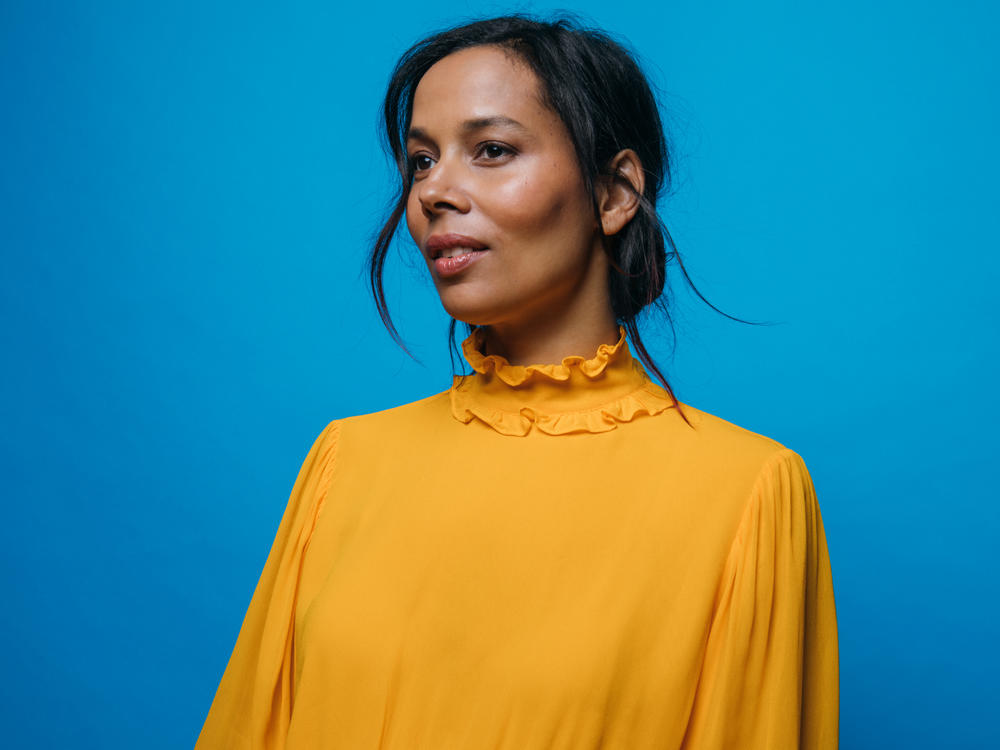Section Branding
Header Content
Rhiannon Giddens Confronts Emotional Whiplash On 'Best Day / Worst Day'
Primary Content
The Morning Edition Song Project, in which musicians compose an original song about the COVID-19 era, returns this week with folk singer-songwriter and multi-instrumentalist Rhiannon Giddens.
Giddens is American, but has spent the pandemic at her home in Limerick, Ireland. When we spoke to her on Monday, Ireland was just a few days into a new six-week lockdown to address the country's growing infection rate. The restrictions are among the toughest in Europe.
Usually, Giddens' work centers on reinterpreting music of the past: She's spent most of her career honoring the African-American folk traditions from slavery onward. For this project, though, she drew from own her life over the past several months. "I kind of wanted to stretch my brain a little bit," the artist says. "It was really hard. [Usually,] if I write about contemporary events, it's through a historical lens. I don't really like trying to think about myself."
For help with the song, Giddens recruited her boyfriend and musical partner, Francesco Turrisi — who happens to own a large and varied collection of instruments. NPR's David Greene spoke with Giddens and Turrisi about the creative and emotional process that led the song they eventually wrote together, "Best Day / Worst Day." Hear the radio version at the audio link, and read on for an edited transcript.
This interview has been edited for length and clarity.
David Greene: In the song, you say it's the best day of your life and it's the worst day of your life. What do you mean by that?
Rhiannon Giddens: Well, I was just thinking about my particular window into the pandemic. I have a certain amount of privilege in that I'm in a safe place, I have a bit of money in the bank and I can wait it out. Not everybody's in that position, so it's just kind of a yo-yo. One day I'm like, gosh, you know, this is great — I'm cooking bread, I'm seeing my kids, we played games. And then the next day you're reading the news and just despairing about all the wasted lives.
Francesco, do you connect to that when you listen to Rhiannon singing the lyrics?
Francesco Turrisi: There was definitely positives to it, because for us that have spent life on the road, it was definitely the first time I ever felt like, actually, I'm not going anywhere — for weeks, months, literally — since I was 21. [I was] trying to work with music and practice and spend more time with my daughter. But after a couple of months, I started hitting a bit of a wall of fatigue, and not really feeling inspired by anything. It's just such extreme ups and downs.
I understand that COVID-19 numbers in Ireland are really spiking again, and you've gone into a much more serious lockdown at this point. What has that meant for your for your daily life?
Giddens: It's always hard to do another one. The first time, everybody's kind of like, "Okay, we're going to do this and everything's going to be over!" And now we know we have to live with this for a while, so this lockdown, I think, is a little bit different from the first one but we're still not technically supposed to go from five kilometers of our home.
Turrisi: It was supposed to be only essential services, but like, bookshops are open.
Giddens: Yeah, we don't know how long that's going to continue. I think everybody's just like, let me see what I can get away with during this lockdown — because it's just, fatigue has set in.
Given what you've been thinking about and sing about through the rest of your career, what's it been like to watch the protests in the United States and this whole moment of racial reckoning from abroad?
Giddens: It's difficult. It's another reason why it was really hard to write this song: My head's just been full of the other big thing that's been happening in the States. Because it is what I've spent my whole career talking about, and trying to explain to my kids why I'm crying at odd points in the day. It's been really hard, but I've just done everything that I can from here, and used music to continue that conversation.
I think about traditional songs, and there are many that are about pain and pining for a faraway home, for better times. I'm sure you've sung a lot of those kinds of songs.
Giddens: You're basically describing the stuff that we just recorded. That's all we've been playing — really sad, beautiful traditional songs.
Is it strange to be living through one of those very moments?
Giddens: I've been listening to a bunch of history podcasts. As you listen to the Peloponnesian Wars or the Aztecs or, you know, listen to all these different periods of history, you just go, "You know what? We're not exempt." Nobody is exempt from living through periods like this in history, so this is just what we're doing. If you have a certain level of privilege, this is nothing compared to World War II, with deprivations of this or that, you know? I think being connected to all of the loss and achievements of history, it just makes what we're going through not that special. I think that's important, actually. We're just a part of the human experience, that's it — no more, no less.
Copyright 2020 NPR. To see more, visit https://www.npr.org.

